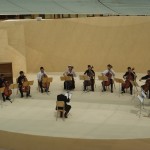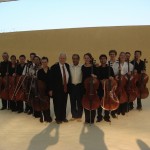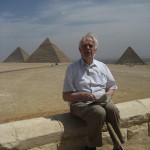I am delighted to introduce Hans Erik Deckert, a new editor at Ovation Press. When I was a student in Denmark I studied for 6 months with Hans Erik while my teacher was on sabbatical. I will never forget the inspirational lessons that I had with Hans Erik Deckert. They made a strong impression on my young musical soul which have remained with me throughout my years as a professor.
Today, Hans Erik is here to offer you a similar type of inspiration:
The Seven Stages of Practice Essential to Musicians
Practice is an individual process. The choice of studies is not subject to pedantry; the ever-present ‘here and now‘ determines how you should proceed in each session. Every single exercise can be studied under each of the following seven stages of practice. Practicing is usually hampered by two main errors: the stages of analysis are too superficial, and the stages of synthesis are generally missed out altogether. Ideally these two factors – analysis and synthesis – should complement one another, a conscientious control of the details offers a better chance of grasping the whole. Practice has its own breathing-process, which oscillates between thinking and forgetting.
1. Sketch a musical image of the work:
Read and play through the work. There are no details at this stage.
2. Build up the musical image:
Perform your initial musical and technical analysis: bowing, fingering, and introductory practice.
3. Refine the musical image:
Work out the technical basis systematically with strict control over every technical action and pay close attention to every detail. Explore a variety of methods & exercises.
4. Start to realize the musical image
Begin to synthesize practice-elements through conscious coordination of left-hand fingering and right-hand bowing aiming for complete control of this coordination / “The Marriage Between the Left and Right Hands” (William Pleeth).
5. Refine your realization of the musical image:
Begin to let your bow conduct every aspect of your playing with complete control behind it. Practice ‘remote control’ of various actions through bowing so that you can regard each bow-stroke as preparation for the next one.
6. Full realization of the musical image
Allow the instrument to play you, not vice versa. Conscious control of technique is forbidden at this stage, but control the musical structure carefully.
7. ‘con amore‘
Music can only transcend through freedom and total lack of resistance. Don‘t think about anything, don‘t try to force anything.
“We do not will things; we just let them happen.“ (Sergiu Celibidache)
Translated from the German by Juliana Hodkinson
To learn more about Hans Erik Deckert, view his Ovation Press editor profile where you can also see his arrangement of Giovanni Gabrieli’s Canzone e Sonate, as well as an original composition Canzona for cello ensemble.
Check out photos below of a group of European musicians that Hans Eric Deckert conducted on a tour to Egypt in 2008!


















Some lovely imagery here – especially the breathing ‘oscillating between thinking and forgetting’.
I find stage 6 interesting, as it uses a very similar image to one I have heard used to describe a very different stage of musical development. I have heard the transition from a ‘novice’ stage to ‘journeyman’ described as moving from a place where the music is controlling the performer to a place where the performer is controlling the music.
Your formulation of course puts the performer in control of the music still, but interesting to think of the instrument in control of the performer.
I’m now wondering how a singer would find this, given that they have that sense of being their instrument – obviously your instruction to banish thoughts of technical control still works though.
Thought-provoking all round indeed!